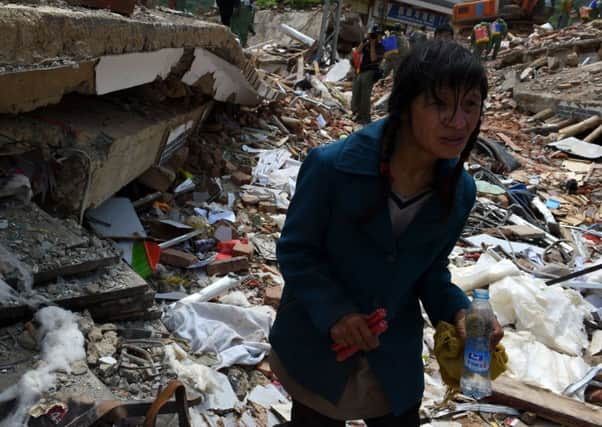Chinese earthquake death toll rises to 589


The Yunnan provincial government said more than 2,400 people were injured in Sunday’s 6.1 magnitude quake in the mountainous farming region of Ludian county – China’s deadliest tremor in four years and its biggest test of emergency response under president Xi Jinping.
At a makeshift headquarters in the forecourt of a cracked school in the worst-hit town of Longtoushan, a senior colonel in the People’s Liberation Army said there might still be hope to find survivors.
Advertisement
Hide AdAdvertisement
Hide Ad“There are a lot of people we may never be able to dig out,” said a senior army spokesman. “But there is still hope.”
Yesterday’s jump in the toll was due to rescuers arriving in places where they had previously been unable to contact anybody, in small farming villages built into the mountains above the main towns, said the spokesman.
There were reports of additional communities buried but still unreached by rescuers.
Some 10,000 troops and hundreds of volunteers have rushed to Ludian to clear roads and dig out survivors from the debris, but landslides and bouts of heavy rains have complicated the efforts.
The quake struck an area of steep hills and narrow roads that are not well suited to all the traffic of the massive relief effort.
Landslides have shorn sheer rocky faces into the region’s valleys and piled earth on roads.
Wang Zhixue, 32, a farmer from Wangjaocun village near Longtoushan, said his wife and two daughters survived the quake but that a landslide wrecked their house. They are now staying in a tent on a hillside.
“We’re getting some help, but the roads must be cleared before we can recover,” Mr Wang said. “It took four hours to get supplies on my motorcycle so getting transportation going is the most important thing.”
Advertisement
Hide AdAdvertisement
Hide AdChina’s state-run media has focused heavily on the relatively scandal-free response to the Yunnan earthquake. The government under Mr Xi – who took over as Communist Party leader in November 2012 and president in early 2013 – has been able to mobilise troops faster than its predecessor, said Willy Lam, a Hong Kong-based political analyst. “Obviously, the military – in terms of personnel, emergency relief operation, and PLA heavy equipment – got there very early,” he said.
“In that perspective, the command and control seemed to be more efficient under Xi Jinping, and his authority was beyond doubt.”
However, some members of the public also have criticised state media coverage.
A series of photos intended to applaud the sacrifice of soldiers drew questions on social media about their preparedness and training when they were shown using muddy water to boil noodles despite the quake zone being awash in bottled water.